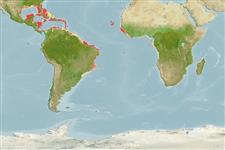Common names from other countries
>
Tetraodontiformes (Puffers and filefishes) >
Monacanthidae (Filefishes)
Etymology: Cantherhines: Greek, kanthos = the outer or inner corner of the eye, where the lids meet, 1646 + Greek, rhinos = nose (Ref. 45335).
Environment: milieu / climate zone / depth range / distribution range
Ökologie
seewasser riff-verbunden; tiefenbereich 2 - 40 m (Ref. 58047), usually 3 - 20 m (Ref. 40849). Tropical; 33°N - 26°S, 99°W - 14°W
Western Atlantic: Florida, USA and Bermuda to São Paulo, Brazil. Eastern Atlantic: St. Paul's Rocks (Ref. 13121).
Size / Gewicht / Alter
Maturity: Lm ? range ? - ? cm
Max length : 46.0 cm TL Männchen/unbestimmt; (Ref. 7251)
Rückenflossenstacheln (insgesamt) : 2; Rückenflossenweichstrahlen (insgesamt) : 34 - 36; Afterflossenstacheln: 0; Afterflossenweichstrahlen: 29 - 32. Adults are brown, with or without many prominent white spots on body and head; caudal fin black with obscure curved median white bar and two indistinct white basal spots (Ref. 13442). Males are readily distinguished from females of about same size by the larger spines on caudal peduncle and by orange color of patch of setae anterior to the peduncular spines on males (Ref. 13442).
Inhabits coral reefs or rocky bottoms (Ref. 5217). Found among gorgonians. Occurs in pairs (Ref. 5521). Feeds mainly on sponges, gorgonians, and algae (Ref. 9710) but also eats hydroids and stinging coral (Ref. 13442).
Life cycle and mating behavior
Maturities | Fortpflanzung | Spawnings | Egg(s) | Fecundities | Larven
Robins, C.R. and G.C. Ray, 1986. A field guide to Atlantic coast fishes of North America. Houghton Mifflin Company, Boston, U.S.A. 354 p. (Ref. 7251)
IUCN Rote Liste Status (Ref. 130435)
CITES (Ref. 128078)
Not Evaluated
Bedrohung für Menschen
Harmless
Nutzung durch Menschen
Fischereien: kommerziell; Aquarium: Kommerziell
Tools
Zusatzinformationen
Download XML
Internet Quellen
Estimates based on models
Preferred temperature (Ref.
115969): 24.9 - 28, mean 27.1 (based on 268 cells).
Phylogenetic diversity index (Ref.
82804): PD
50 = 0.5002 [Uniqueness, from 0.5 = low to 2.0 = high].
Bayesian length-weight: a=0.02089 (0.01295 - 0.03371), b=2.94 (2.80 - 3.08), in cm Total Length, based on LWR estimates for this species & (Sub)family-body (Ref.
93245).
Trophic level (Ref.
69278): 3.1 ±0.1 se; based on diet studies.
Widerstandsfähigkeit (Ref.
120179): mittel, Verdopplung der Population dauert 1,4 - 4,4 Jahre. (Preliminary K or Fecundity.).
Fishing Vulnerability (Ref.
59153): Moderate vulnerability (36 of 100).
